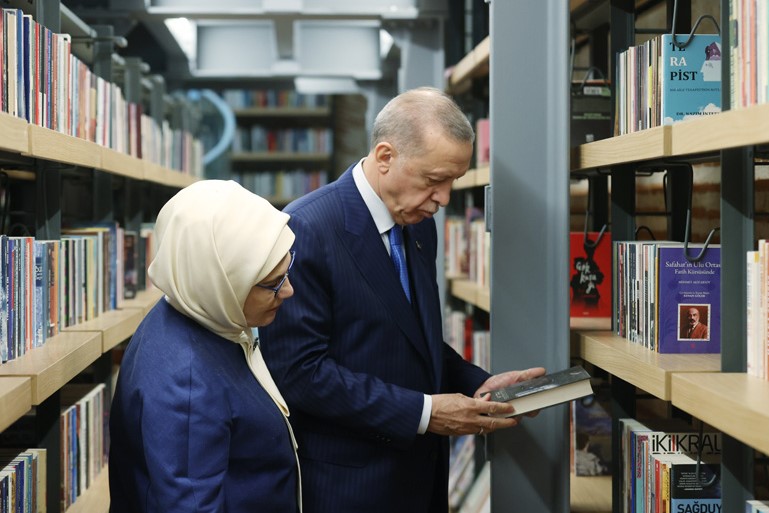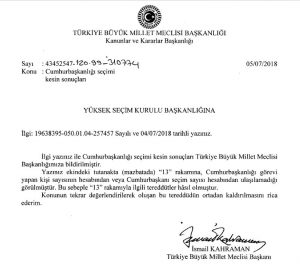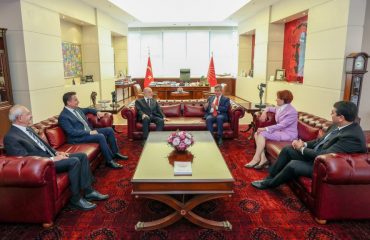

While opposition leaders refrained from raising the issue because “they don’t want Erdoğan to play the victim,” the AKP seems to have recognized the legal loophole against Erdoğan’s presidential candidacy. The President and his wife, Emine Erdoğan, are seen examining books at the Rami Library, which was converted from a military barracks by the Ministry of Culture and Tourism. (Photo: Presidency)
Among the contradictions Turkey faces ahead of the crucial 2023 elections is the gap between political activity that is in compliance with the Constitution and “realpolitik,” the German term for “politics in accordance with circumstances, not principles.”
This is most evident in the question of whether President and ruling Justice and Development Party’s (AKP) leader Recep Tayyip Erdoğan can run again for the presidency. Despite warnings from legal experts, opposition leaders are reluctant to even raise the issue of Erdoğan’s candidacy, lest he try to “play the victim” again after two decades in power.
Newly emerging information and documents show that the AKP leadership was aware of the shortcomings of the Constitution, which was hastily drafted in 2017 in the wake of the 15 July 2016 coup attempt and brought to a referendum under the state of emergency, from the beginning.
The documents revealed by journalist Deniz Zeyrek on Fox TV’s Orta Sayfa programme on January 13, citing Deva Party spokesperson İdris Şahin, show that the AKP was not only aware of these shortcomings but also tried to sweep them under the carpet.
According to the documents, the Supreme Board of Elections (YSK), upon the request of the Parliament, corrected Erdoğan’s presidential certificate and reissued a new one. However, this correction was documented.
“Correction” letter from the Parliament to the YSK
This explains why the 2017 constitution stipulates a block to the judicial remedy against the decisions of the Supreme Electoral Board.
President Erdoğan was re-elected to the presidency, which he has been holding since 2014, in the June 24, 2018 elections, held according to the new constitution, which was adopted on April 16, 2017 in a referendum with the support of Nationalist Movement Party (MHP) leader Devlet Bahçeli.
Since Erdoğan had been elected as the 12th President in 2014, the YSK prepared the election certificate defining Erdoğan as “elected as the 13th President” and sent it to the Turkish Grand National Assembly on July 4, 2018.
Up until this point, the process was following its normal course. However, AKP jurists realized that the emphasis on the 13th President would cause problems for Erdoğan’s candidacy in the 2023 elections due to the provision in Article 101 of the new Constitution that stipulates, “A person can be elected president at most twice.”
Accordingly, İsmail Kahraman, then Speaker of the Parliament, wrote a letter to the Presidency of the YSK on 5 July 2018.
“It has been pointed out that the number 13 can’t be figured out from the number of presidents or the number of elections,” Kahraman wrote, asking that “the issue be re-evaluated and the confusion cleared up.”

The official letter from the parliamentary speaker’s office that asks the YSK to delete the term “13” in the election certificate of Erdoğan in order to eliminate constitutional problem for his candidacy.
YSK changed its decision
In some ways, the parliament article was correct, because Mustafa Kemal Atatürk, İsmet İnönü, and Celal Bayar all served multiple terms as president. However, there was also an issue that seemed to have been deliberately or negligently ignored. In the 1961 and 1982 Constitutions, the word “once” had been annexed to the Constitution, and this specific provision had been maintained until the 2007 Constitutional Amendment, which envisaged the election of the President by the people. The 2007 constitutional amendment included a temporary or exception clause to prevent 11th President Abdullah Gül from running again.
However, the 2017 Constitution did not include a provisional clause or exception clause (which should have been included in Article 101), stipulating that Erdoğan’s presidency between 2014 and 2018 would not be counted.
Despite this, the YSK, then chaired by Sadi Güven, convened on the same day and changed its decision from the day before. In the letter written to the Presidency of the Grand National Assembly of Türkiye and the Presidency of the Republic on 5 July, it was stated that “it was unanimously decided to remove the phrase 13 and a new document to be prepared with only the words ‘elected as the president’.”
In this way, it was calculated that the debate on Erdoğan’s possible presidential candidacy in the 2023 elections would be eliminated. On the other hand, the YSK also documented in writing that it had changed its decision upon the request of the Turkish Grand National Assembly.
Will Erdoğan be the President for life?
It is understood that this question was once asked within the AKP. İdris Şahin, who was one of the influential lawmakers in the AKP at the time – now the spokesperson of Deva Party – recalls some of the discussions at that time as follows:
– “In the first stage, there was talk of adding a temporary paragraph to Article 101 of the Constitution. The calculation was as follows: the 2014-2009 period will be completed, and a second election with the temporary article will be possible with a constitutional amendment and a parliamentary majority. With this method, Erdoğan will be able to run in the 2024 elections just like the 2019 elections, and he will win the 2024 elections and remain in power until 2029.
– “Even then, in party circles, I remember conversations where people asked, “Will he do it for life?” “He will be 75-76 years old in 2029, isn’t that enough?”
“The negligence of those who know too much”
“However, when the 2017 Constitution was finalized, this temporary clause was forgotten,” Şahin added. “Because the text of the Constitution was no longer discussed in broad consultation, but among a few people. There was negligence, and now it is the fault of those who know too much and who pretend now that there was no negligence.
“It is said that Constitution 101 has been changed as it is, but what has changed is the replacement of the qualifications and impartiality of the Presidency with the election of the President.” “The clause on the maximum of two terms of candidature for a person has been preserved. Article 176 of the Constitution states that “marginal articles” do not count as part of the Constitution’s text.”
“They knew it”
Şahin suggests that the process of changing the YSK decision in 2018 at the request of the Speaker of the Parliament was linked to Erdoğan’s possible candidacy, saying:
“They knew exactly what they were doing.” “If they weren’t concerned, they wouldn’t have refused the 13th President’s certificate.”
In fact, there are not one but two points of contention regarding President Erdoğan’s candidacy. One is whether Erdoğan can be a candidate even if the elections are held on time, and the other is whether the elections should be called earlier, especially if the President dissolves the Parliament.
Jurists from Serap Yazıcı to İbrahim Kaboğlu, Süheyl Batum to Mehmet Gün are of the opinion that the Constitution does not allow this. Mustafa Şentop, Speaker of the Grand National Assembly of Turkey, Mehmet Uçum, Chief Legal Advisor to the President of the Republic, and Özlem Zengin, AKP parliamentary chair, believes that there is no problem.
Although opposition leaders, particularly CHP leader Kemal Kılıçdaroğlu and IYI Party leader Meral Akşener, have refrained from raising the issue of President Erdoğan’s candidacy in order to prevent him from resorting to victim rhetoric, this issue continues to be discussed in legal and political circles as the elections approach.
A million-dollar question: Can Erdoğan run again for presidency?

